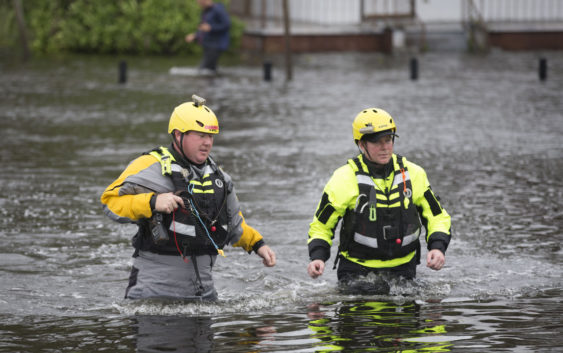- Even light rain causing flash flooding issues on Houston's north side
- LIST: High water locations, street flooding as heavy rain falls in the Houston area
- China on Alert for Heavy Rain and Floods From Typhoon Gaemi
- Flash flood threat; A day to be Weather Aware
- Power-Thirsty Bitcoin Miners Are Flooding the Energy Center of Texas
Scammers will be out after Hurricane Florence. Here’s how to avoid them.

Hurricane Florence thrashed the coasts of the Carolinas with punishing winds and storm surges before drenching much of the state over the weekend. Hundreds of thousands of people were left without power, buildings were flooded and hundreds were rescued from rising waters.
In the aftermath of a disaster like Florence, or any disaster, thousands of people come forward to donate their time, skills and money. But that outpouring of generosity can also draw scammers looking to profit off good intentions. Here are some ways to stop scams and avoid them.
If you’re going to donate, research the charity beforehand.
Organizations like charitynavigator, charitywatch and give.org vet charities and make sure your dollars go where the charity says they’re going.
“Oftentimes, (crises) of large scale and coverage enable certain individuals to take advantage of your generosity and pocketing your donation for their own personal benefit. Do your research to find a charity with a proven track record of success. Look to see if the organization you’re giving to is a registered public 501(c)(3),” Charity Navgiator wrote in a tipsheet for disaster giving.
For a list of charities confirmed to be working during Florence and through its recovery, check out this list from the Charlotte Observer.
Be suspicious if an organization asks you for money “RIGHT NOW”
Put your guard up if you receive aggressive, urgent requests for money.
“We tend to see the complaints coming in from senior citizens the most,” a Better Business Bureau spokesperson said, according to KARE. “They will talk fast and tell you to give now, ‘we need it right now.’ Legitimate organizations are going to accept your donation whenever you’re ready to give it.”
Pennsylvania state police also said to “be suspicious of any stranger calling asking for money, regardless of the situation,” according to Levittown Now.
If your home has been damaged, research the contractors before hiring them for repairs or cleanup.
“After natural disasters like Hurricanes Irma and Harvey, unlicensed contractors and scammers often come into the affected area promising immediate clean-up and debris removal. Some demand payment up-front for work they never do. Others simply lack the skills, licenses, and insurance to legally do the work,” the Federal Trade Commission wrote.
To protect yourself, the agency recommends asking to see licenses if the area requires them, taking down names, license plate numbers or any other identifying information, asking for references, getting an estimate and an official contract. Above all, “trust your gut,” the agency wrote.
Be wary of crowdfunding campaigns
Sites like GoFundMe allow individuals to set up their own fundraising pages to raise money for hospital bills, supplies, repairs, or any other costs. But scammers sometimes post fraudulent campaigns on the site. The site urged users to investigate campaigns by checking who was running them, if family and friends were active, commenting or donating, and if the reason for the fundraiser was clear.
GoFundMe announced earlier this week that it had taken steps to ensure funds donated for Florence do actually go people who need them, but it doesn’t hurt to be cautious anyway. If a campaign looks suspicious, contact the crowdfunding site’s administrators.